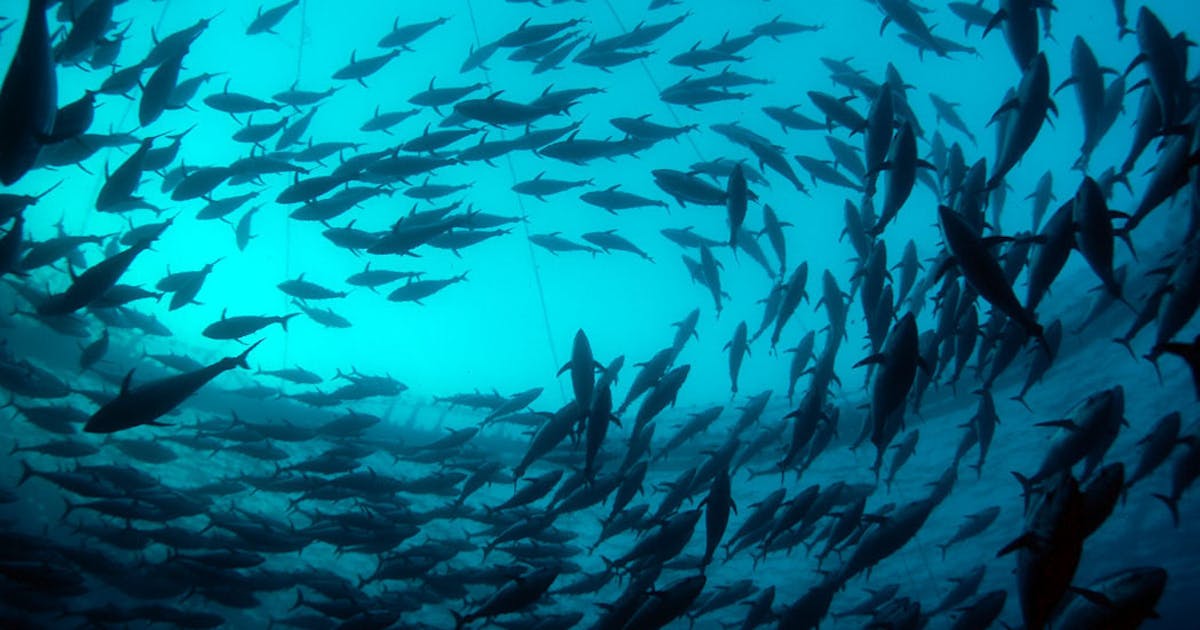
Fish farming is becoming more sustainable, but there is still a long way to go.
The story: Two decades ago, aquaculture — commonly referred to as “fish farming” — was driving the rampant destruction of mangroves, polluting natural ecosystems and depleting stocks of wild fish, which were used as feed for farmed species. Since then, the industry has made significant strides toward sustainability, according to a new study. Improvements include the increased use of plant-based fish feed, a decrease in deforestation and expanded production of farmed oysters and clams — which don’t require any feed and can actually filter nutrients from the water, reported Somini Sengupta for The New York Times.
The big picture: Currently, one-third of the world’s wild fisheries are depleted because of overfishing, pollution and the effects of climate change. Making aquaculture more sustainable is critical to producing more fish for growing populations, without depleting the planet’s oceans and freshwater ecosystems.
“When done well, aquaculture can play a sustaining role in global food systems by providing expanded food production and livelihood benefits with relatively minimal environmental harm,” Conservation International’s Dane Klinger, a co-author on the study, told Scienmag. “This assessment will help industry, government and other stakeholders navigate the opportunities and obstacles that remain ahead.”
Longer summers may sound like a “hot” idea, but they could have dire consequences.
The story: If countries do not ramp up their efforts to cut greenhouse gas emissions, global warming could extend summer heat and humidity by three months by 2100, according to a new study. Over the past 60 years, summer conditions have lasted 17 days longer on average worldwide — resulting in more frequent extreme heat waves, reported Denise Chow for NBC News.
The big picture: "Shifting seasons can wreak a lot more havoc than you think when you realize all the systems that are tuned to the timing of the seasons," Scott Sheridan, a climate scientist, told NBC News.
While extended summers may seem harmless — or even appealing — to some, these conditions can have catastrophic consequences — from widespread crop loss to a surge in heat-related illnesses. Additionally, research shows that hot and humid conditions could fuel increasingly severe wildfires, such as the ones that burned through Australia in 2019 and 2020.
Poaching and habitat degradation are pushing Africa’s elephants to the brink.
The story: Once classified as a single species in Africa, the savanna elephant and forest elephant are now officially recognized as distinct species — and both are at extreme risk of extinction, according to a new report. Larger and easier to monitor, savanna elephant populations have declined by more than 50 percent in the past 70 years, while forest elephant numbers have plummeted by more than 80 percent in just under a century, reported Rachel Nuwer for National Geographic.
“At this point, there can be no doubt that poaching and habitat loss have devastated populations of elephants all across Africa,” Scott Schlossberg, a data analyst at non-profit Elephants Without Borders, told National Geographic “A few elephant populations are doing well, but the long-term trends for the continent as a whole are poor.”
The big picture: Experts agree that regulating the global wildlife trade and imposing stronger enforcement to stop poachers is critical to saving Africa’s elephants. However, recent reports indicated an uptick in the trade of ivory and bushmeat during the pandemic, likely due to food scarcity and the loss of income from tourism, experts say.
To minimize poaching and land degradation in Africa, Conservation International’s Herding 4 Health program supports farmers in high-biodiversity rural areas to help them restore degraded rangelands, while improving cattle health and providing a steady income stream — even during uncertain times.
"fish" - Google News
March 29, 2021 at 08:35PM
https://ift.tt/31wnW4a
For farmed fish, a 'vegetarian' diet is good for the planet: 3 stories you may have missed - Conservation International
"fish" - Google News
https://ift.tt/35JkYuc
https://ift.tt/3feFffJ
Bagikan Berita Ini














0 Response to "For farmed fish, a 'vegetarian' diet is good for the planet: 3 stories you may have missed - Conservation International"
Post a Comment